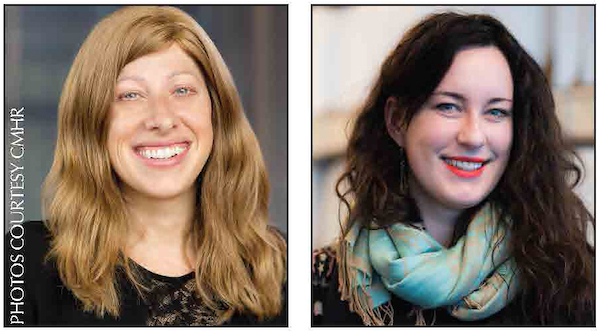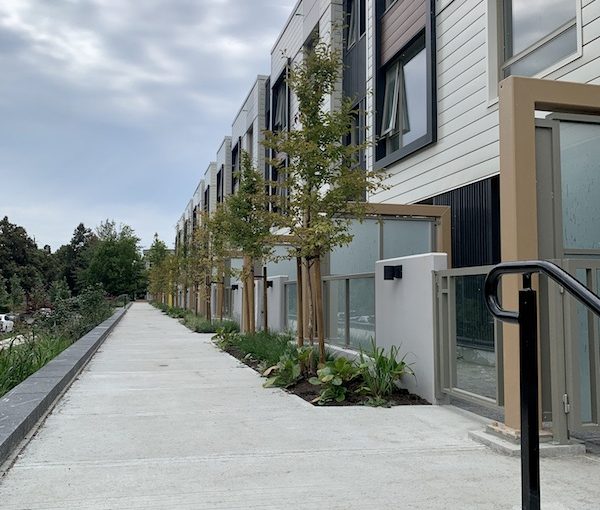A tent city in Vancouver’s Oppenheimer Park, 2019. Canada has some of the lowest stock of social housing – about 3.5% of total housing stock, compared with 16% or 17% in the United Kingdom, and 7.5% across the European Union. (photo by Ted McGrath / flickr.com)
Recent federal legislation promises to revolutionize the way Canada confronts housing and homelessness – but the paper promises depend on tangible actions, according to expert panelists assembled last month at an annual human rights dialogue convened by two leaders in Vancouver’s Jewish community.
Housing as a Human Right was presented online Nov. 29 by the Simces & Rabkin Family Dialogue for Human Rights, in partnership with the Canadian Museum for Human Rights and Equitas, a centre for human rights education.
Zena Simces and Simon Rabkin, founders of the dialogue, now in its fifth year, set the terms of the discussion by outlining the scope of the problem.
“We established this dialogue to enhance understanding and create an opportunity for conversation on current human rights issues that are impacting us as a community and as a society, with the hope of generating positive actions,” said Simces, who has decades of experience in human rights issues, including as a leader in the now-defunct Canadian Jewish Congress.
A recent poll in Vancouver, Simces noted, indicates that 48% of respondents identify housing as a top priority.
“We have legislation in Canada, the National Housing Strategy Act, that enshrines housing as a human right,” said Simces. “But what does this actually mean? Why is housing being treated as a commodity and not as a social good and a legal right? What can be done to make a difference?”
Rabkin, a medical doctor who has provided healthcare in underserviced areas in Canada’s north and in Africa, explained the health outcomes of homelessness and inadequate housing.
“There is good evidence that people dealing with inadequate housing confront a wide range of adverse health consequences such as poor mental health, lung disease and various infectious diseases, to name a few,” he said. “As a physician, I see these health consequences, specifically poor cardiometabolic health, including higher prevalence and poor control of conditions such as hypertension, diabetes and heart failure.
“Death rates of the homeless in North America are three to five times greater than in the general population,” he added. “Cardiovascular diseases are a major cause of death in homeless adults between 25 and 64 years of age and are three times more common in the homeless than in an age-matched general population.”
The event was moderated by homelessness and anti-poverty activist Michael Redhead Champagne, a community leader in North Winnipeg, where Simces and Rabkin both grew up.
The National Housing Strategy Act, passed by Parliament in 2019, has the potential to shift housing from a charity model to a justice model approach, according to the event’s panelists. It applies international law to the Canadian context and created a federal housing advocate.
“It’s led to more data because we have terrible data about housing need and information around unhoused populations,” said panelist Alexandra Flynn, a University of British Columbia law professor and director of the Housing Research Collaborative, which focuses on Canada’s housing crisis. She is a data evangelist who helped create the Housing Assessment Resource Tools project. These federally funded tools allow anyone to enter their municipality and see how much housing is needed, based on available data, she said.
“Having that information is a necessary foundation for the right to housing,” she said. “How can we know what we need to do as a community, as governments, if we don’t know how different people are impacted?”
Some of the foremost work in the field is being done at the municipal level, said Flynn, whose academic work centres on local governance. For example, she said the city of Toronto has forced the three levels of government to the table and, in London, Ont., community activists have forced officials to adopt a “human rights lens” for how people in tent cities are treated.
The 2019 legislation is so revolutionary it led panelist Kaitlin Schwan to leave a job at the United Nations in New York to return to Canada. Schwan is now executive director of the Women’s National Housing & Homelessness Network and a senior researcher at the Canadian Observatory on Homelessness. She teaches social policy at the University of Toronto’s Faculty of Social Work and is a former senior researcher for the United Nations Special Rapporteur for the Right to Adequate Housing.
“It was absolutely historic,” she said of the National Housing Strategy Act. “It creates a new legal path for advancing housing affordability and adequacy in Canada.”
The act sets out guidelines for how government is accountable to rights-holders.
“It’s based in international human rights law and these laws dare to insist on a society that holds everyone equal in dignity and worth,” said Schwan, whose work emphasizes the impacts of gender on the housing issue.
“We don’t often think of the housing crisis as a gendered crisis, but it really, really is,” she said. “When you look at the research, we know that women and gender-diverse folks, especially racialized folks, indigenous folks, LGBTQ2S folks, are more likely to be in core housing need, live in poor housing, have poor income, struggle with security tenure. There is a huge range of data in this area.”
A group of individuals and agencies has made a human rights claim under the new legislation and the federal housing advocate is undertaking an inquiry. After that report is delivered to Parliament, said Schwan, the federal housing minister will have 120 days to respond.
Schwan criticized existing patterns of presumed solutions which, she said, see a majority of funding going into housing that is not going to meet the needs of those with low, or very low, incomes.
“A majority of where we’re spending federal dollars in terms of the development of housing is in middle class or slightly lower housing development,” she said.
Compared to other developed countries, Schwan said, Canada has some of the lowest stock of social housing – about 3.5% of total housing stock, compared with 16% or 17% in the United Kingdom, and 7.5% across the European Union.
“Do not believe the narrative that this problem is not solvable, that it’s too complex, that we can’t get there,” she said. “It is not true. There are countries, like Finland, like others around the world, who have eradicated homelessness – not through tremendously complex initiatives that we can never understand. There are roadmaps around the world that we can be drawing on as a nation. We have the resources and we have the capacity to build a really dignified world for us to live in.”
The third panelist, Lavern Kelly, runs the Youth Excelling & Attaining Housing (YEAH!) Parenting Program at Watari Counseling and Support Services. She works with youth, especially single women and young mothers, in Vancouver’s Downtown Eastside. As a youth, she was a ward of child services.
Canada’s federal system, she said, allows the three levels of government to point fingers at one another and avoid addressing the problem.
Public opinion is another barrier, she added. Many have the belief that all youth in need have housing and that there are many supports in place to protect them.
“This is not the case,” said Kelly. “We know housing is difficult for even the average person. Can you imagine how hard it is for youth to find housing, with all the barriers that they face just by being a youth? We need to support our youth by advocating for the right to housing.”
Adequate housing is critical to young people’s success, she said.
“When basic needs are met, one can succeed,” said Kelly. “When a youth is housed, they have a stronger sense of safety and belonging. They can build roots, networks, friends and neighbours.”
The recorded event can be accessed at the Canadian Museum for Human Rights website or YouTube channel.










